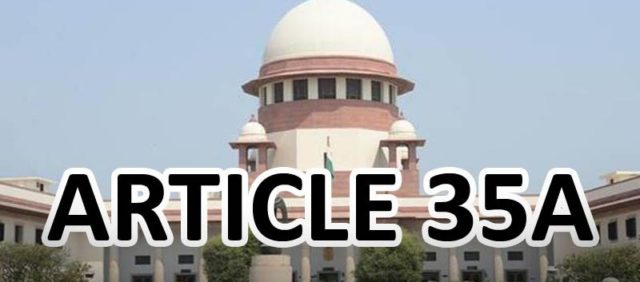For the uninitiated and uninformed, Article 35A is a section that was added to the Indian Constitution through a Presidential Order in 1954 by the then President, Rajendra Prasad through the provisions provided for under Article 370 of the Constitution. It was enacted in consequence to the ‘1952 Delhi agreement’ between the Indian Prime Minister, Pandit Jawaharlal Nehru and the then Prime Minister of Jammu & Kashmir, Sheikh Abdullah.

Article 35A of the Indian Constitution specifically refers to the power conferred upon the Jammu and Kashmir state legislature to define “permanent residents” of the state. These permanent residents, in turn, are provided special rights and privileges which are not available to non-residents. In addition, the article also confers unparalleled power wherein the said laws once passed by the state legislature cannot even be challenged.
Thus, a petition challenging the constitutional validity of the article was filed in the country’s apex court by a set of NGOs who pleaded that the article was illegally added to the Constitution through a Presidential order without presenting the same to the Indian Parliament. Another petition filed by a Supreme Court lawyer also calls the controversial article as discriminatory towards women.
If we look at the historical genesis of Article 35A, the genesis can be found in the words: ‘Kashmir for Kashmiris’. Hence, the article provides a basis through which only permanent residents can settle in the state, acquire property, avail government jobs or even scholarships. Non-residents do not get any such rights.
Even as we wait for the Supreme Court to hear and rule on the petition, there are a few questions that we actually need to ask ourselves. If Jammu and Kashmir is a part of India, can it actually discriminate amongst “Indians”? Especially since we keep harping on the tenet of equality for all. In other words, if Kashmir is only for Kashmiris, all other states should only be for those state residents.
Of course, there is another side to the argument too. If we don’t have a problem with Article 35A and do not decide to do away with it, do we even have a right to get angry when the Shiv Sena talks of ‘Maharashtra for Maharashtrians’. Truth be told, such double standards defy the equality paradigm completely.
And what if tomorrow, the rest of the country was to reciprocate in response to Article 35A? What I mean is: What if tomorrow other states started declining jobs or housing to Kashmiris? After all, if I am not welcome in your home, what makes you think you are welcome in mine?!?
I know that is a harsh analogy that borders on being offensive even though it was a rhetorical question. But truth be told, we seriously need to ask ourselves some hard questions! How long are we going to pretend that no problem exists?!? Will ignorance really help resolve the situation? If J&K is a part of India, how can Indians not be welcome in India? Now that is a question worth asking?!?






























